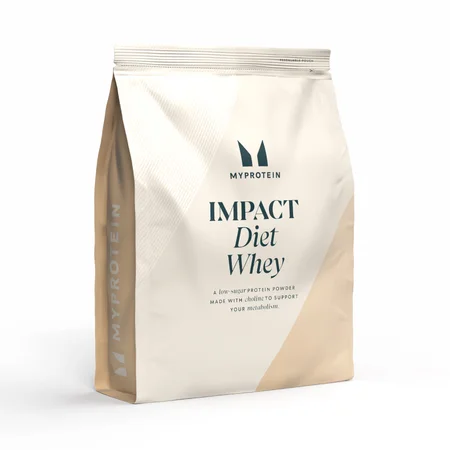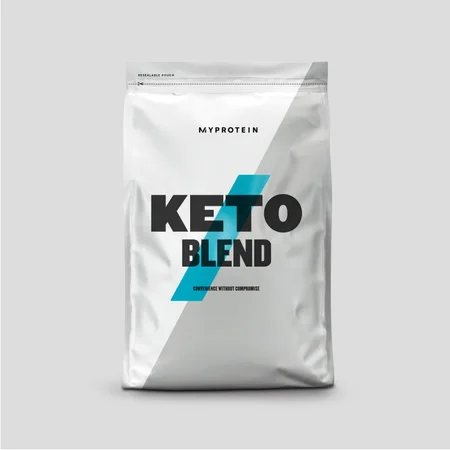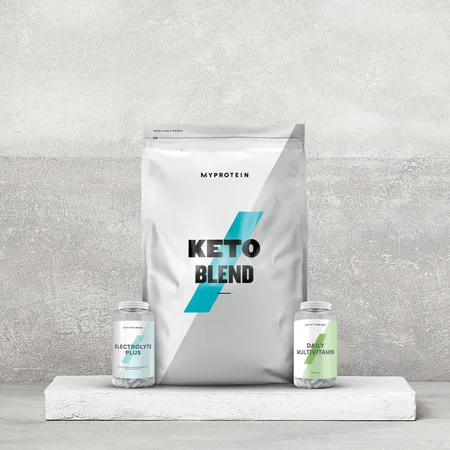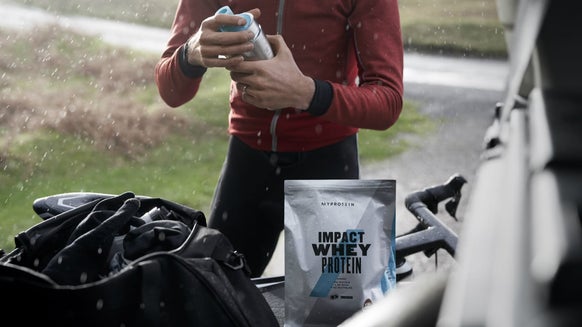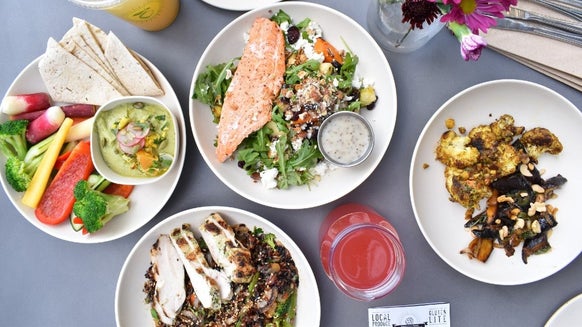7 Diets People Are Still Going Crazy About In 2018 | Best Diets

New year, new me (for real this time though). The results are in – here are the best diets to follow this year.
It’s that time of year again – you’ve overindulged during the festive period and you feel like you need to cleanse your mind, body and soul of all the food-related malefactions you’ve committed. Well, the results are in for this year’s best diets to follow, plus the diets people are still going crazy for, so we’ve done a quick roundup for you (hint: paleo is
1. The DASH Diet

The 21 year-old DASH diet ranked number 1 Best Diet Overall in the US News Best Diets Ranking 2018, and we think it's because it emphasises eating real food with flexible guidelines.
What is it?
DASH, which stands for ‘Dietary Approaches to Stop Hypertension’, puts an emphasis on eating foods that are thought to fend off high blood pressure – and could also help with weight loss (in combination with an overall calorie deficit), too.
Eat: Foods rich in protein, fibre, potassium, magnesium, and calcium, like fruits and vegetables, whole grains, nuts, lean protein and low-fat dairy.
Limit: Saturated fat intake (including full-fat dairy and fatty meats), red meat, salt, tropical oils, and sugary foods and drinks.
Does it work?
It’s no wonder that the DASH diet was ranked number 1 best diets overall in 2018, as it has a hefty amount of scientific research to back up its claims of lowering hypertension and improving cardiovascular risk factors like being overweight (e.g. 1, 2, 3).
One of the main characteristics of the DASH diet, however, is that it requires long-term a change in lifestyle, not just a short-term fix, so the yo-yo dieters seem to struggle to stick with it.
2. The Mediterranean Diet

The renowned Mediterranean diet came joint-first in this year’s US News Best Diets Ranking (tied with the DASH diet).
What is it?
Heaps of evidence over the years has shown us that folks living near the Mediterranean Sea are generally healthier, have less body fat, and live for longer than other western countries like the UK and USA.
Eat lots of: Fruits and veggies, whole grains, legumes, nuts, olive oil, seafood (especially those rich in omega-3 fatty acids), herbs and spices, and then even more fruits and vegetables.
Eat in moderation: Poultry, eggs, cheese and yoghurt. A glass of red wine per day is also recommended (if you like), too.
Limit: Sugary foods and red meat.
Does it work?
The evidence that the Mediterranean diet decreases risk of certain health issues is pretty convincing4, but lifestyle factors like physical activity, outdoor life and happiness could be partially responsible, too (next plane to Spain, anyone?).
Research also suggests that following the Mediterranean diet (in combination with a calorie deficit) results in similar long-term weight loss to a low-carb diet5.
The thing to remember is that this diet doesn’t have a super-strict meal plan – it’s more like a set of healthy principles to follow, which means it’s up to you to work out what exactly your diet will look like and how many calories to eat to lose/maintain weight.
With its set of sensible, healthy principles, we think this diet definitely deserves its number 2 spot on this year's best diets list.
Find out more about the Mediterranean diet
3. The Keto Diet

The Keto diet was one of the top Googled diets in 2017, with #keto appearing on social media newsfeeds the world over, but does it deserve to be in the best diets list, or is it just another fad diet?
What is it?
The ketogenic diet was originally designed for use in children to help control epileptic seizures, but the new version is designed specifically for fat-loss. It's based on eating foods that force your body to safely enter a state of ketosis, which means using fat for energy, rather than sugar. Advocates of the Keto diet claim that it suppresses appetite, too.
Eat: Around 70-75% of your diet should be made up of fat, and around 20% of protein.
Limit: Carbohydrates should make up around 5-10% of your diet, mostly from non-starchy veggies.
Does it work?
The jury’s still out on this one – some research suggests that the Keto diet in combination with a calorie-deficit achieves marginally better long-term weight loss than a low-fat, calorie-restricted diet6.
It’s worth noting, though, as the Keto diet (for weight loss) is pretty new, there aren’t many studies researching its long-term impact on health.
Plus, if you do try out the Keto diet, be prepared for major fatigue while your body adapts to an extremely low-carb diet, as well as a relatively anti-social eating plan (we’re talking next to no carbs, all day, every day).
Read more about the Keto diet
4. The Vegan Diet

Veganism is nothing new for 2018, but as the trend continues to soar, this diet undeniably deserves some air time in the best diets list.
What is it?
Vegans exclude foods that come from animals from their diet, and some vegans also choose not to use other products that come from animals like leather and wool.
There are plenty of reasons people go vegan – from slimming down and improving health to lowering their carbon footprint and helping the planet. Plus, there are more tasty vegan substitutes out there than ever before, so vegan food doesn’t have to resemble the contents of your rabbit’s food bowl.
Does it work?
In relation to weight loss on a vegan diet, recent research has shown that vegans might consume less saturated fats and calories than non-vegans, which means they may be less likely to pile on the pounds.
But it’s not just cutting out meat that’ll make your waist circumference smaller. Eating plenty of wholesome foods rather than processed junk is the key to a healthy vegan (and non-vegan) diet.
Despite popular belief, you should be able to get all the nutrients you need from a vegan diet with a little forward planning. In fact, many vegans have been found to consume more fruit and vegetables than their non-vegan counterparts, so their diets can be higher in all-important fibre, folic acid, vitamins C and E, potassium, magnesium and phytochemicals8. Just remember to eat a good variety of plant-based protein, spread throughout the day.
Find out more about veganism
5. The Flexitarian Diet

Following a flexitarian diet is becoming more and more popular in a society that cares about environmental sustainability (but equally doesn’t want to give up meat altogether), which is why this diet made it onto this year's best diets list.
What is it?
Flexitarianism is a little bit like ‘casual vegetarianism’, which means reducing your intake of animal protein and increasing intake of alternative protein-rich plant-based foods.
Eat lots of: Plant-based protein-rich foods like legumes (beans, lentils, peas etc.), nuts and seeds.
Eat in moderation: Animal and fish protein.
Limit: There aren’t any exclusions in the flexitarian diet.
Does it work?
Increasing your intake of heart-healthy foods like nuts and seeds and fibrous foods like legumes while ensuring you get enough protein in your diet is definitely a smart choice, in line with national healthy eating recommendations. But be warned, if you’re looking to keep healthy and trim, this diet isn’t a free pass to eat all the pizza your heart desires (even if it is vegetarian pizza).
Scientific research has found that some vegetarians and flexitarians tend to weigh less than their carnivorous counterparts9,10, but this could be because they’re more generally health-conscious than some meat-eaters.
6. Intermittent Fasting

Time-restricted feeding, the 5:2 diet, alternate-day fasting – they’re all forms of intermittent fasting. But what exactly is intermittent fasting, and should you give it a go?
What is it?
Intermittent fasting means having short cycles of not eating (i.e. fasting) and eating repeatedly, which some say can help blast stubborn fat, control insulin levels, and improve diet-adherence (as you’ll only be restricting calories at certain times). The theory behind intermittent fasting and fat loss is that once you’ve been fasting for longer than 12 hours, your body is able to access the fat stores that have previously been inaccessible on a regular eating schedule.
There are a few different types of intermittent fasting that people commonly undertake:
Alternate-day fasting: Complete or partial (around 500kcal) fasting every other day.
Time-restricted feeding: Only eating within a certain time period during the day, which is usually about 4-8 hours long.
Whole-day fasting: Having 1-2 non-consecutive complete or partial (around 500kcal) fast days per week.
Does it work?
In relation to weight loss, the principles of intermittent fasting seem promising – only diet on certain days (albeit drastically) as opposed to every day, then reap the benefits. But does it work, and is it better than daily calorie restriction?
Well, one study has shown that intermittent fasting seems to only produce similar weight loss in comparison to daily calorie restriction, but it might actually be superior in preserving lean muscle mass11. Unfortunately, there isn’t sufficient evidence to support the long-term sustainable effects of intermittent fasting12.
Our verdict? We’ll be keeping our eyes on the research for this one.
Read more about intermittent fasting
7. The Low-FODMAP Diet

The anecdotal evidence that the low-FODMAP diet alleviates bloating is overwhelming, but do the facts hold up? We find out whether this one deserves to be in this year's list of best diets.
What is it?
The low-FODMAP diet is a relatively new diet, often prescribed to those who have gas and bloating.
The acronym, ‘FODMAP’, stands for fermentable oligosaccharides, disaccharides, monosaccharides and polyols, which are poorly absorbed simple and complex sugars found in certain foods. These poorly absorbed sugars are thought to ferment in the gut and cause symptoms like bloating.
The foods to limit depend very much on the individual, as some people are thought to be able to tolerate certain foods better than others.
People are usually prescribed an ‘elimination’ diet, where they cut out one food item at a time, monitor the symptoms, then reintroduce them and repeat the process with other foods to find out what they can and can't tolerate. The list of foods is pretty extensive, so here’s an overview:
- Certain vegetables like onions, garlic, pulses, and brassicas (like broccoli and cauliflower)
- Wheat and several other cereals and grains like couscous, rye, spelt and amaranth
- Certain fruits like apples, pears and stone fruits
- Dairy products containing lactose
Does it work?
Plenty of scientific research indicates that a low-FODMAP diet helps with bloating13, but the main problem with this diet is that it can be extremely restrictive and socially isolating. The low-FODMAP diet isn’t for everyone and should be carefully monitored so you aren’t missing out on any important nutrients, so if you’re experiencing symptoms like bloating, see a trained professional like a doctor or registered dietitian before you embark on it.
Remember to talk to your doctor before you embark upon any restrictive eating or exercise plan.

Jennifer Blow has a Bachelor’s of Science in Nutritional Science and a Master’s of Science by Research in Nutrition, and now specialises in the use of sports supplements for health and fitness, underpinned by evidence-based research.
Jennifer has been quoted or mentioned as a nutritionist in major online publications including Vogue, Elle, and Grazia, for her expertise in nutritional science for exercise and healthy living.
Her experience spans from working with the NHS on dietary intervention trials, to specific scientific research into omega-3 fatty acid supplementation and also the effect of fast foods on health, which she has presented at the annual Nutrition Society Conference. Jennifer is involved in many continuing professional development events to ensure her practise remains at the highest level. Find out more about Jennifer’s experience here.
In her spare time, Jennifer loves hill walking and cycling, and in her posts you’ll see that she loves proving healthy eating doesn’t mean a lifetime of hunger.
- Sacks, F. M., Svetkey, L. P., Vollmer, W. M., Appel, L. J., Bray, G. A., Harsha, D., … & Karanja, N. (2001). Effects on blood pressure of reduced dietary sodium and the Dietary Approaches to Stop Hypertension (DASH) diet. New England Journal of Medicine, 344(1), 3-10.
- Obarzanek, E., Sacks, F. M., Vollmer, W. M., Bray, G. A., Miller, E. R., Lin, P. H., … & Bales, C. W. (2001). Effects on blood lipids of a blood pressure–lowering diet: the Dietary Approaches to Stop Hypertension (DASH) Trial. The American journal of clinical nutrition, 74(1), 80-89.
- Svetkey, L. P., Simons-Morton, D., Vollmer, W. M., Appel, L. J., Conlin, P. R., Ryan, D. H., … & Kennedy, B. M. (1999). Effects of dietary patterns on blood pressure: subgroup analysis of the Dietary Approaches to Stop Hypertension (DASH) randomized clinical trial. Archives of Internal Medicine, 159(3), 285-293.
- Gerber, M., & Hoffman, R. (2015). The Mediterranean diet: health, science and society. British Journal of Nutrition, 113(S2), S4-S10.
- Mancini, J. G., Filion, K. B., Atallah, R., & Eisenberg, M. J. (2016). Systematic review of the Mediterranean diet for long-term weight loss. The American Journal of Medicine, 129(4), 407-415.
- Bueno, N. B., de Melo, I. S. V., de Oliveira, S. L., & da Rocha Ataide, T. (2013). Very-low-carbohydrate ketogenic diet v. low-fat diet for long-term weight loss: a meta-analysis of randomised controlled trials. British Journal of Nutrition, 110(7), 1178-1187.
- Dewell, A., Weidner, G., Sumner, M. D., Chi, C. S. & Ornish, D. (2008). A very-low fat vegan diet increases intake of protective dietary factors and decreases intake of pathogenic dietary factors. Journal of the American Dietetic Association, 108 (2), 347–56.
- Davey, G. K., Spencer, E. A., Appleby, P. N., Allen, N. E., Knox, K. H. & Key, T. J. (2003). EPIC-Oxford: lifestyle characteristics and nutrient intakes in a cohort of 33,883 meat-eaters and 31,546 non meat-eaters in the UK. Public Health Nutrition, 6 (3), 259–69.
- Berkow, S. E., & Barnard, N. (2006). Vegetarian diets and weight status. Nutrition Reviews, 64(4), 175-188.
- Spencer, E. A., Appleby, P. N., Davey, G. K., & Key, T. J. (2003). Diet and body mass index in 38 000 EPIC-Oxford meat-eaters, fish-eaters, vegetarians and vegans. International journal of obesity, 27(6), 728-734.
- Varady, K. A. (2011). Intermittent versus daily calorie restriction: which diet regimen is more effective for weight loss?. Obesity reviews, 12(7).
- Harris, L., McGarty, A., Hutchison, L., Ells, L., & Hankey, C. (2018). Short‐term intermittent energy restriction interventions for weight management: a systematic review and meta‐analysis. Obesity Reviews, 19(1), 1-13.
- Staudacher, H. M., Irving, P. M., Lomer, M. C., & Whelan, K. (2014). Mechanisms and efficacy of dietary FODMAP restriction in IBS. Nature Reviews Gastroenterology and Hepatology, 11(4), 256.
